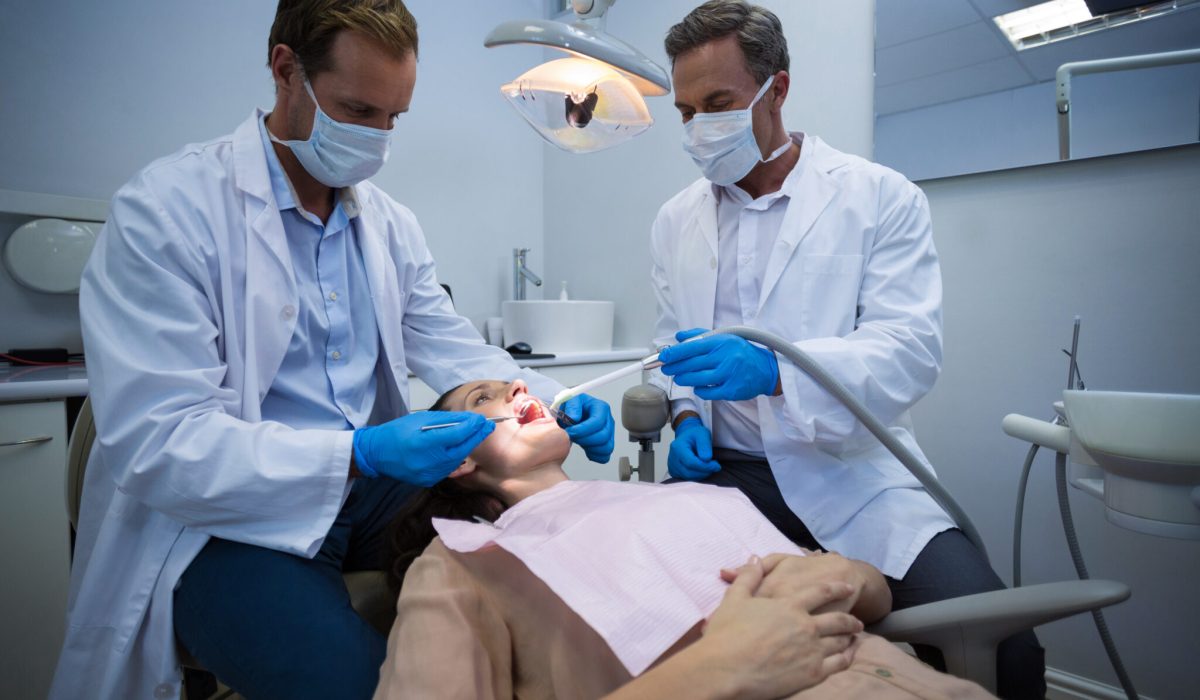Are you considering dental implants? While dental implants have become a popular and reliable option for those with tooth loss, decay, or extraction, it’s essential to understand the factors that can impact implant success. One of the most significant factors is smoking.
Smoking and dental implants don’t mix well. Cigarette smoke contains chemicals and bacteria that can increase the risk of failure and implant complications. Nicotine can also affect blood flow and bone integrity, hindering the integration of the implant with the jawbone.
In addition, smoking can delay the healing process and increase the risk of infection, causing additional treatments and potential health complications. Unfortunately, even light smokers face a higher risk of dental implant failure than non-smokers.
Don’t let smoking sabotage your dental health. With proper understanding and guidance from a qualified dentist, you can take steps to minimise the risks and improve your chances of success. By quitting smoking or at least reducing your cigarette consumption, you can improve the health of your gums, reduce the risk of infection, and promote a faster and smoother healing period.

Table of Contents
ToggleSummary of the Content:
- Dental implants are titanium posts surgically placed into the jawbone to provide a stable foundation for a replacement tooth.
- Dental implants stimulate the jawbone to promote natural bone growth and osseointegration, which is the process of the implant fusing with the jawbone.
- Smoking increases the risk of periodontal disease and tooth loss, which can affect the success of dental implant treatment.
- Smoking can delay healing and increase infection risk, directing to dental implant failure and other health complications.
- Nicotine affects blood flow, hindering the body’s implant integration with the jawbone.
- Quitting smoking before dental implant surgery can improve the chances of successful implant treatment.
- Smokers should seek professional advice to manage their oral health and reduce the risks of dental implant failure.
- Smokers should consider other tooth replacement options if they cannot quit smoking or reduce their cigarette consumption.
The Process of Dental Implants: A Quick Overview
The dental implant procedure involves a surgical procedure to place a small titanium post into the jawbone, where it fuses with the bone through a process called osseointegration. This post acts as an artificial tooth root, providing a stable foundation for the replacement tooth or teeth.
While the dental implant procedure may involve bone grafts, tooth extraction, and other preparatory steps, the result is a long-lasting and durable tooth replacement that looks and functions like natural teeth.
What Are Dental Implants?
Dental implants can be used to replace one or multiple teeth, and they can be used to support a range of dental restorations, including crowns, bridges, and dentures. Dental implants are a practical choice for replacing missing or damaged teeth. Dental implants are a popular alternative to dentures and bridges because they look, feel, and function like natural teeth.
How Dental Implants Work
Dental implants work by mimicking the structure and function of natural teeth. The implant is a small, screw-shaped post made of titanium, which is biocompatible and can fuse with bone tissue. They are also versatile and can be used to replace one or multiple missing teeth and can even be used to support a full arch of dentures. Dental implants are designed to function and look like natural teeth, allowing patients to eat, speak, and smile confidently. While getting dental implants can take several months and requires a surgical procedure, the result is a durable, long-lasting replacement option for missing teeth.
How Smoking Affects Oral Health
Smoking is a well-known health hazard with numerous adverse effects on the body. But many people may not be aware of the impact that smoking can have on their oral health. From tooth decay to gum disease, smoking can cause various oral health issues with long-term consequences. Smokers are at a significantly higher risk of developing oral health problems than non-smokers. Whether you are a heavy smoker or just an occasional smoker, it is important to understand the potential impacts of smoking on your oral health and dental implants.
Gum Disease and Tooth Loss
Smoking is a harmful habit that can cause numerous implant complications, including oral health issues. One of the most common conditions linked to smoking is gum disease. Gum disease, or periodontal disease, is an infection of the gum tissue that supports the teeth. This condition occurs when the bacteria in dental plaque accumulate and damage the soft tissue and bone that hold the teeth in place. Smoking increases the risk of gum disease by damaging the blood vessels and reducing blood flow to the gums.
If left unaddressed, gum disease can lead to tooth loss. Smoking also affects healing after tooth extraction, implant placement, and other dental procedures. It can cause dry mouth, delayed healing, blood clots, dry socket, and bad breath.
The Healing Process for Smokers
Smoking can damage the salivary glands and reduce saliva production, which leads to a dry mouth. Saliva plays an essential role in the healing process by protecting the soft tissue and reducing the risk of infection. Smoking also affects the body’s ability to heal wounds, making it difficult for the implant to osseointegrate with the bone.
The effects of smoking can be particularly harmful to patients undergoing dental implant procedures. Dental implant placement involves the surgical placement of a titanium post into the jawbone. Osseointegration is a critical step in the healing process, where the implant fuses with the bone to create a stable foundation for the replacement tooth. Smoking can damage the blood vessels and reduce blood flow to the area, making it harder for the implant to integrate with the bone.
The Impact of Smoking on Dental Implant Success
Smoking has been associated with numerous health complications, and it’s no secret that it can harm oral health. In dental implants, smoking can cause significant problems for the procedure’s success. Complications associated with smoking include implant failure, difficulty healing wounds, and a greater risk of infection. Additionally, smoking can interfere with the body’s natural healing mechanisms, showing delays in the healing period and potentially affecting the implant’s osseointegration process.
However, there are ways to reduce the risks associated with smoking and improve implant success. Quitting smoking before implant placement can significantly help improve implant success and seek professional advice for managing oral health.
Dental Implant Failure Rates in Smokers
Dental implant failure can be a significant concern for anyone undergoing dental implant treatment, but studies have shown that smokers have a higher risk of dental implant failure than non-smokers. Smokers have been found to have a dental implant failure rate up to two times higher than non-smokers. This increased risk is due to the impact that smoking has on oral health and the body’s ability to heal and recover from surgery.
One of the primary factors contributing to implant failure in smokers is the effect that smoking has on blood flow and circulation. Nicotine and other chemicals in tobacco smoke can restrict blood vessels and reduce blood flow to the gums and bones surrounding the implant. This impairs the body’s ability to heal and can lead to implant failure.
Implant Complications Associated with Smoking
Dental implant complications associated with smoking can be a significant risk factor for patients undergoing dental implant surgery. Here are some potential complications to be aware of:
- Poor healing:
Smoking affects the entire healing process, slowing it down and making it more difficult for the body to recover. - Delays in healing:
The chemicals in cigarettes can cause delays in the healing process, leading to other complications. - Increased risk of infection:
Smoking weakens the body’s protective barriers, making it more susceptible to infections that can lead to implant failure. - Blood clots:
Smoking can increase the chances of blood clots forming, preventing proper healing and leading to implant failure. - Dry socket:
Smoking can increase the risk of developing a dry socket, a painful condition that can prevent proper healing and increase the risk of implant failure. - Poor oral hygiene:
Smoking can damage soft tissue and bone, making it more challenging to maintain proper oral hygiene, leading to implant complications. - Failure of osseointegration:
Smoking can also damage the process of osseointegration, where the implant fuses with the surrounding bone, causing implant failure.
Reducing the Risks: What You Can Do
Dental implants have become a popular tooth replacement option due to their natural look and feel. However, cigarette smoking, whether electronic or traditional cigarettes, can hurt dental implant placement and healing. Smokers are more likely to experience implant failure and complications than non-smokers. Seeking professional advice and quitting smoking before the procedure are ways to improve the chances of successful implant placement and reduce the risk of complications.
Quitting Smoking Before Dental Implant Surgery
Quitting smoking before dental implant surgery can significantly improve the chances of successful implant placement and reduce the risk of complications. Cigarette smoking can impair healing, causing delays and poor and slow recovery. Smoking damages blood vessels and the protective barrier that helps with implant fusion. Cigarette chemicals can also increase the chances of infection, ultimately causing osseointegration failure.
If you are a smoker considering dental implant placement, quitting before the procedure is highly recommended. Even reducing the habit until surgery can improve implant success rates. Your dentist can provide resources and support to help you quit smoking and improve your oral health.
Seeking Professional Advice for Managing Oral Health
In addition to quitting smoking before dental implant surgery, seeking professional advice for managing oral health is also essential. Regular dental check-ups and cleanings can help prevent gum disease and tooth decay, which can impact the success of dental implant placement.
Dentists can also guide proper oral hygiene practices, such as brushing and flossing techniques, to help maintain healthy teeth and gums. In addition, they can recommend products like mouthwash or fluoride treatments to strengthen teeth and protect them from damage.
If a patient has already undergone dental implant placement and is a smoker, seeking professional advice on managing their oral health can also help improve the chances of implant success. Dentists can recommend ways to promote healing, such as avoiding smoking and maintaining good oral hygiene.
The Benefits of Quitting Smoking for Dental Implant Patients
Quitting smoking can have a significant positive impact on dental implant success and overall oral health. By improving implant success rates and reducing the risk of complications, patients who quit smoking before dental implant placement can enjoy the benefits of this popular tooth replacement option.
Improved Implant Success Rates
Quitting smoking can significantly improve implant success rates in dental implant patients. Smokers are likelier to experience implant complications, such as implant failure and delayed healing, than non-smokers.
However, quitting smoking at least 2-3 months before the dental implant procedure can help improve the success rates of the implant.
Smoking damages the mouth’s soft tissue and blood vessels, slowing healing. It can also decrease blood flow, causing delays in healing and decreasing the chances of osseointegration, the process by which the implant fuses with the jawbone.
By quitting smoking, patients can reduce the risk of complications during and after implant placement, directing to a higher success rate for dental implants.
Better Overall Oral Health
In addition to improving implant success rates, quitting smoking can improve oral health. Cigarette smoking is a known risk factor for several oral conditions, including gum disease, tooth decay, and bad breath.
Tobacco use can also cause dry mouth, which reduces salivary flow and can lead to a higher risk of developing oral infections and conditions.
Quitting smoking reduces the risk of these oral conditions and can improve the situation of existing oral health problems. Seeking professional help to manage oral health and quitting smoking can lead to better oral health and a healthier smile.
Weighing the Pros and Cons of Dental Implants for Smokers
While dental implants offer a long-lasting and durable choice for missing teeth, smokers need to consider the potential risks and benefits of the procedure.
Here are some pros and cons of dental implants for smokers:
Pros:
- Implants provide a long-lasting and natural-looking tooth replacement option.
- Implants can help prevent bone loss and maintain the structure of the jaw.
- Unlike bridges, implants do not require adjacent teeth to be modified or extracted.
Cons:
- Smoking can increase the risk of implant failure and complications during healing.
- The implant procedure requires a surgical intervention that may not be suitable for all patients.
- Implants like dentures or bridges can be more expensive than tooth replacement options.
Alternatives to Dental Implants for Smokers
Dental implants have been a popular tooth replacement option for many years, providing a long-lasting and natural-looking choice for those who have lost teeth. However, smokers may face higher risks of implant failure and complications than non-smokers. Alternative options are available for smokers who cannot quit or are not good candidates for dental implant placement.
Considering Other Tooth Replacement Options
While dental implants are a popular tooth replacement option, smokers may need to consider other alternatives due to the increased risk of complications.
Here are some other tooth replacement options to consider:
- Dentures:
A removable device that can replace one or more missing teeth. - Bridges:
A stable device connecting adjacent teeth to fill a gap caused by missing teeth. - Partial dentures:
Similar to dentures, but designed to replace only a few missing teeth. - Resin-bonded bridges:
A conservative option that uses a metal or porcelain framework to bond a replacement tooth to adjacent teeth. - Flipper:
A temporary removable tooth replacement option.
Final Thoughts
Smoking can have significant detrimental effects on oral health and the success of dental implant procedures. Smokers are at a higher risk of experiencing implant complications, delayed healing, and failure. However, by quitting smoking and seeking professional advice for managing oral health, individuals can improve their oral health and increase their chances of a successful dental implant placement. If you are a smoker, it is essential to consider the potential risks and benefits before undergoing dental implant procedures. In some cases, alternative tooth replacement options may be a better choice. Ultimately, the decision to quit smoking and pursue dental implant procedures should be made with careful consideration and guidance from dental professionals.
If you’re a smoker and considering dental implants, don’t hesitate to reach out to our team at Smiles in Currambine. Our experienced team of dentists can provide personalised advice and treatment plans to improve your oral health and help you achieve a beautiful, functional smile. Contact us today to schedule a consultation and take the first step towards a healthier, happier you with dental implants.

Dr Saket Rai
Dr. Saket Rai is a passionate dentist with over 15 years of experience in general dentistry. He specializes in dental implants, wisdom teeth removal, laser dentistry, cosmetic dentistry, and Digital Smile Design. With a Bachelor of Dental Surgery degree and a Masters in Forensic Odontology, he stays updated with the latest dental technology and techniques. Dr. Rai has extensive training in dental implants and believes in continuous professional development to provide the highest standard of care. Outside of dentistry, he enjoys spending time with his two boys and has interests in reading, documentaries, and cricket.








